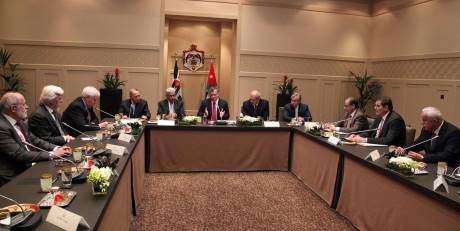King Abdullah II of Jordan has stressed the importance of moving ahead with the country's plans for nuclear energy, calling for Jordan to become a role model for the peaceful use of nuclear energy.
 |
| King Abdullah II meets with representatives from the nuclear energy program IAG (Image: Royal Hashemite Court) |
The monarch made his comments as he met with the International Advisory Group (IAG) set up in November last year to review Jordan's progress towards implementing its nuclear energy program. The meeting was also attended by prime minister Abdullah Ensour.
According to a statement from the royal court, the king said Jordan was keen to be a 'model pioneer' in the use of nuclear energy for peaceful purposes, with a commitment to the highest levels of security, safety and international best practices, and with full transparency.
Chaired by former prime minister Marouf Bakhit, the IAG's members include former UK Atomic Energy Authority chair Barbara Judge, former International Atomic Energy Agency deputy director general Werner Burkart, former director general of the European Organisation for Nuclear Research (CERN) Rolf Huer, former assistant US secretary for nuclear energy Peter Lyons, president emeritus at Carnegie Institution for Science Richard Meserve, former commissioner of the Japan Atomic Energy Commission Akira Omoto, former Jordanian energy minister Khaled Shraideh, and former UK chief inspector of nuclear installations head of the country's Office for Nuclear Regulation Mike Weightman.
According to the Jordan Times, Bhakit said that the group expects to submit its detailed report within three months.
In March 2015, Russia and Jordan signed an intergovernmental agreement on cooperation in the construction and operation of two 1000 MWe VVER units at Az-Zarqa in central Jordan.
Jordan's first nuclear reactor, the Jordan Research and Training Reactor, is being built at the Jordan University for Science and Technology by a consortium led by the Korean Atomic Energy Research Institute (KAERI) with Daewoo. The 5 MWt reactor is based on version of Korea's 30 MWt Hanaro design, and is expected to start up in 2016 or 2017.
Researched and written
by World Nuclear News






_55401.png)
_23009.jpg)






